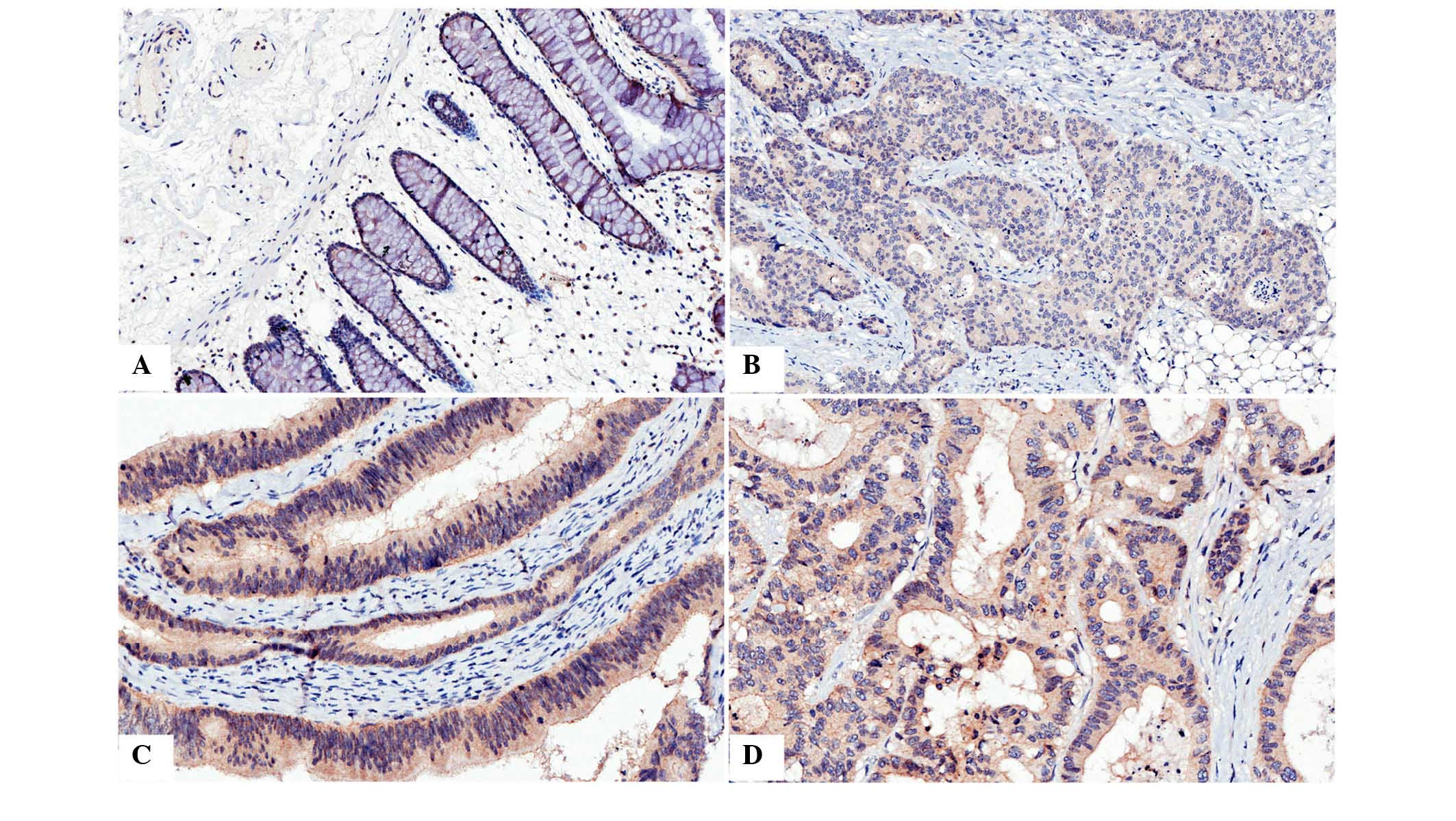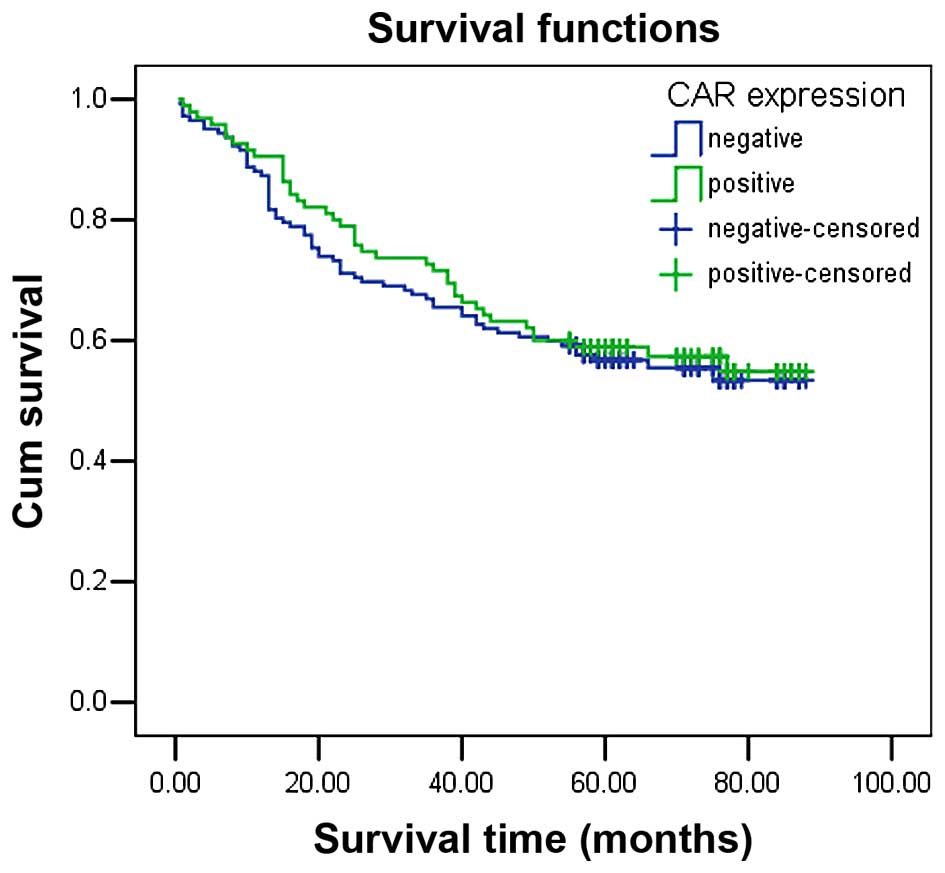|
1
|
Siegel R, Naishadham D and Jemal A: Cancer
statistics, 2013. CA Cancer J Clin. 63:11–30. 2013. View Article : Google Scholar : PubMed/NCBI
|
|
2
|
Chen W, Zheng R, Zhang S, Zhao P, Li G, Wu
L and He J: Report of incidence and mortality in China cancer
registries, 2009. Chin J Cancer Res. 25:10–21. 2013.PubMed/NCBI
|
|
3
|
Chang GJ, Kaiser AM, Mills S, Rafferty JF
and Buie WD; Standards Practice Task Force of the American Society
of Colon and Rectal Surgeons: Practice parameters for the
management of colon cancer. Dis Colon Rectum. 55:831–843. 2012.
View Article : Google Scholar : PubMed/NCBI
|
|
4
|
Rayburn ER, Wang W, Zhang R and Wang H:
Experimental therapy for colon cancer: Anti-cancer effects of TLR9
agonism, combination with other therapeutic modalities, and
dependence upon p53. Int J Oncol. 30:1511–1519. 2007.PubMed/NCBI
|
|
5
|
Zuckerman DS and Clark JW: Systemic
therapy for metastatic colorectal cancer: Current questions.
Cancer. 112:1879–1891. 2008. View Article : Google Scholar : PubMed/NCBI
|
|
6
|
Bergelson JM, Cunningham JA, Droguett G,
Kurt-Jones EA, Krithivas A, Hong JS, Horwitz MS, Crowell RL and
Finberg RW: Isolation of a common receptor for Coxsackie B viruses
and adenoviruses 2–5. Science. 275:1320–1333. 1997. View Article : Google Scholar : PubMed/NCBI
|
|
7
|
Cohen CJ, Shieh JT, Pickles RJ, Okegawa T,
Hsieh JT and Bergelson JM: The coxsackievirus and adenovirus
receptor is a transmembrane component of the tight junction. Proc
Natl Acad Sci USA. 98:15191–15196. 2001. View Article : Google Scholar : PubMed/NCBI
|
|
8
|
Walters RW, Freimuth P, Moninger TO,
Ganske I, Zabner J and Welsh MJ: Adenovirus fiber disrupts
CAR-mediated intercellular adhesion allowing virus escape. Cell.
110:789–799. 2002. View Article : Google Scholar : PubMed/NCBI
|
|
9
|
Pandha HS, Stockwin LH, Eaton J, Clarke
IA, Dalgleish AG, Todryk SM and Blair GE: Coxsackie B and
adenovirus receptor, integrin and major histocompatibility complex
class I expression in human prostate cancer cell lines:
Implications for gene therapy strategies. Prostate Cancer Prostatic
Dis. 6:6–11. 2003. View Article : Google Scholar : PubMed/NCBI
|
|
10
|
Kasuya H, Takeda S, Shimoyama S, Shikano
T, Nomura N, Kanazumi N, Nomoto S, Sugimoto H and Nakao A:
Oncolytic virus therapy-foreword. Curr Cancer Drug Targets.
7:123–125. 2007. View Article : Google Scholar : PubMed/NCBI
|
|
11
|
Abdolazimi Y, Mojarrad M, Pedram M and
Modarressi MH: Analysis of the expression of coxsackievirus and
adenovirus receptor in five colon cancer cell lines. World J
Gastroenterol. 13:6365–6369. 2007. View Article : Google Scholar : PubMed/NCBI
|
|
12
|
Anders M, Vieth M, Röcken C, Ebert M,
Pross M, Gretschel S, Schlag PM, Wiedenmann B, Kemmner W and Höcker
M: Loss of the coxsackie and adenovirus receptor contributes to
gastric cancer progression. Br J Cancer. 100:352–359. 2009.
View Article : Google Scholar : PubMed/NCBI
|
|
13
|
Wang Y, Thorne S, Hannock J, Francis J, Au
T, Reid T, Lemoine N, Kirn D and Halldén G: A novel assay to assess
primary human cancer infectibility by replication-selective
oncolytic adenoviruses. Clin Cancer Res. 11:351–360.
2005.PubMed/NCBI
|
|
14
|
Yamashita M, Ino A, Kawabata K, Sakurai F
and Mizuguchi H: Expression of coxsackie and adenovirus receptor
reduces the lung metastatic potential of murine tumor cells. Int J
Cancer. 121:1690–1696. 2007. View Article : Google Scholar : PubMed/NCBI
|
|
15
|
Wunder T, Schmid K, Wicklein D, Groitl P,
Dobner T, Lange T, Anders M and Schumacher U: Expression of the
coxsackie adenovirus receptor in neuroendocrine lung cancers and
its implications for oncolytic adenoviral infection. Cancer Gene
Ther. 20:25–32. 2013. View Article : Google Scholar
|
|
16
|
Wunder T, Schumacher U and Friedrich RE:
Coxsackie adenovirus receptor expression in carcinomas of the head
and neck. Anticancer Res. 32:1057–1062. 2012.PubMed/NCBI
|
|
17
|
Matsumoto K, Shariat SF, Ayala GE, Rauen
KA and Lerner SP: Loss of coxsackie and adenovirus receptor
expression is associated with features of aggressive bladder
cancer. Urology. 66:441–446. 2005. View Article : Google Scholar : PubMed/NCBI
|
|
18
|
Dietel M, Häfner N, Jansen L, Durst M and
Runnebaum IB: Novel splice variant CAR 4/6 of the coxsackie
adenovirus receptor is differentially expressed in cervical
carcinogenesis. J Mol Med (Berl). 89:621–630. 2011. View Article : Google Scholar
|
|
19
|
Giaginis CT, Zarros AC, Papaefthymiou MA,
Papadopouli AE, Sfiniadakis IK and Theocharis SE: Coxsackievirus
and adenovirus receptor expression in human endometrial
adenocarcinoma: Possible clinical implications. World J Surg Oncol.
6:592008. View Article : Google Scholar : PubMed/NCBI
|
|
20
|
Martin TA, Watkins G and Jiang WG: The
Coxsackie-adenovirus receptor has elevated expression in human
breast cancer. Clin Exp Med. 5:122–128. 2005. View Article : Google Scholar : PubMed/NCBI
|
|
21
|
Martino TA, Petric M, Weingartl H,
Bergelson JM, Opavsky MA, Richardson CD, Modlin JF, Finberg RW,
Kain KC, Willis N, et al: The coxsackie-adenovirus receptor (CAR)
is used by reference strains and clinical isolates representing all
six serotypes of coxsackievirus group B and by swine vesicular
disease virus. Virology. 271:99–108. 2000. View Article : Google Scholar : PubMed/NCBI
|
|
22
|
Persson A, Fan X, Widegren B and Englund
E: Cell type- and region-dependent coxsackie adenovirus receptor
expression in the central nervous system. J Neurooncol. 78:1–6.
2006. View Article : Google Scholar
|
|
23
|
Reimer D, Steppan I, Wiedemair A, Concin
N, Hofstetter G, Marth C, Müller-Holzner E and Zeimet AG: Soluble
isoforms but not the transmembrane form of coxsackie-adenovirus
receptor are of clinical relevance in epithelial ovarian cancer.
Int J Cancer. 120:2568–2575. 2007. View Article : Google Scholar : PubMed/NCBI
|
|
24
|
Wang Y, Wang S, Bao Y, Ni C, Guan N, Zhao
J, Salford LG, Widegren B and Fan X: Coxsackievirus and adenovirus
receptor expression in non-malignant lung tissues and clinical lung
cancers. J Mol Histol. 37:153–160. 2006. View Article : Google Scholar : PubMed/NCBI
|
|
25
|
Zhang NH, Song LB, Wu XJ, Li RP, Zeng MS,
Zhu XF, Wan DS, Liu Q, Zeng YX and Zhang XS: Proteasome inhibitor
MG-132 modifies coxsackie and adenovirus receptor expression in
colon cancer cell line lovo. Cell Cycle. 7:925–933. 2008.
View Article : Google Scholar : PubMed/NCBI
|
|
26
|
Reeh M, Bockhorn M, Görgens D, Vieth M,
Hoffmann T, Simon R, Izbicki JR, Sauter G, Schumacher U and Anders
M: Presence of the coxsackievirus and adenovirus receptor (CAR) in
human neoplasms: A multitumour array analysis. Br J Cancer.
109:1848–1858. 2013. View Article : Google Scholar : PubMed/NCBI
|
|
27
|
Stecker K, Vieth M, Koschel A, Wiedenmann
B, Röcken C and Anders M: Impact of the coxsackievirus and
adenovirus receptor on the adenoma-carcinoma sequence of colon
cancer. Br J Cancer. 104:1426–1433. 2011. View Article : Google Scholar : PubMed/NCBI
|
|
28
|
Zhou X, Xie G, Wang S, Wang Y, Zhang K,
Zheng S, Chu L, Xiao L, Yu Y, Zhang Y and Liu X: Potent and
specific antitumor effect for colorectal cancer by CEA and Rb
double regulated oncolytic adenovirus harboring ST13 gene. PLoS
One. 7:e475662012. View Article : Google Scholar : PubMed/NCBI
|
|
29
|
Korn WM, Macal M, Christian C, Lacher MD,
McMillan A, Rauen KA, Warren RS and Ferrell L: Expression of the
coxsackievirus- and adenovirus receptor in gastrointestinal cancer
correlates with tumor differentiation. Cancer Gene Ther.
13:792–797. 2006. View Article : Google Scholar : PubMed/NCBI
|
|
30
|
Rauen KA, Sudilovsky D, Le JL, Chew KL,
Hann B, Weinberg V, Schmitt LD and McCormick F: Expression of the
coxsackie adenovirus receptor in normal prostate and in primary and
metastatic prostate carcinoma: Potential relevance to gene therapy.
Cancer Res. 62:3812–3818. 2002.PubMed/NCBI
|
|
31
|
van Gijn W, Krijnen P, Lemmens VE, den
Dulk M, Putter H and van de Velde CJ: Quality assurance in rectal
cancer treatment in the Netherlands: A catch up compared to colon
cancer treatment. Eur J Surg Oncol. 36:340–344. 2010. View Article : Google Scholar
|
|
32
|
Cady B and Stone MD: The role of surgical
resection of liver metastases in colorectal carcinoma. Semin Oncol.
18:399–406. 1991.PubMed/NCBI
|
|
33
|
Tomlinson JS, Jarnagin WR, DeMatteo RP,
Fong Y, Kornprat P, Gonen M, Kemeny N, Brennan MF, Blumgart LH and
D'Angelica M: Actual 10-year survival after resection of colorectal
liver metastases defines cure. J Clin Oncol. 25:4575–4580. 2007.
View Article : Google Scholar : PubMed/NCBI
|
|
34
|
Fisher KD, Stallwood Y, Green NK, Ulbrich
K, Mautner V and Seymour LW: Polymer-coated adenovirus permits
efficient retargeting and evades neutralising antibodies. Gene
Ther. 8:341–348. 2001. View Article : Google Scholar : PubMed/NCBI
|
|
35
|
Lanciotti J, Song A, Doukas J, Sosnowski
B, Pierce G, Gregory R, Wadsworth S and O'Riordan C: Targeting
adenoviral vectors using heterofunctional polyethylene glycol FGF2
conjugates. Mol Ther. 8:99–107. 2003. View Article : Google Scholar : PubMed/NCBI
|
|
36
|
Menezes KM, Mok HS and Barry MA: Increased
transduction of skeletal muscle cells by fibroblast growth
factor-modified adenoviral vectors. Hum Gene Ther. 17:314–320.
2006. View Article : Google Scholar : PubMed/NCBI
|
|
37
|
Segerman A, Atkinson JP, Marttila M,
Dennerquist V, Wadell G and Arnberg N: Adenovirus type 11 uses CD46
as a cellular receptor. J Virol. 77:9183–9191. 2003. View Article : Google Scholar : PubMed/NCBI
|
|
38
|
Short JJ, Pereboev AV, Kawakami Y, Vasu C,
Holterman MJ and Curiel DT: Adenovirus serotype 3 utilizes CD80
(B7.1) and CD86 (B7.2) as cellular attachment receptors. Virology.
322:349–359. 2004. View Article : Google Scholar : PubMed/NCBI
|
|
39
|
Tuve S, Wang H, Ware C, Liu Y, Gaggar A,
Bernt K, Shay-akhmetov D, Li Z, Strauss R, Stone D and Lieber A: A
new group B adenovirus receptor is expressed at high levels on
human stem and tumor cells. J Virol. 80:12109–12120. 2006.
View Article : Google Scholar : PubMed/NCBI
|
|
40
|
Krasnykh V, Belousova N, Korokhov N,
Mikheeva G and Curiel DT: Genetic targeting of an adenovirus vector
via replacement of the fiber protein with the phage T4 fibritin. J
Virol. 75:4176–4183. 2001. View Article : Google Scholar : PubMed/NCBI
|
|
41
|
van Beusechem VW, van Rijswijk AL, van Es
HH, Haisma HJ, Pinedo HM and Gerritsen WR: Recombinant adenovirus
vectors with knobless fibers for targeted gene transfer. Gene Ther.
7:1940–641. 2000. View Article : Google Scholar : PubMed/NCBI
|
|
42
|
Ma J, Zhao J, Lu J, Jiang Y, Yang H, Li P,
Zhao M, Liu K and Dong Z: Coxsackievirus and adenovirus receptor
promotes antitumor activity of oncolytic adenovirus H101 in
esophageal cancer. Int J Mol Med. 30:1403–1409. 2012.PubMed/NCBI
|
|
43
|
Kitazono M, Goldsmith ME, Aikou T, Bates S
and Fojo T: Enhanced adenovirus transgene expression in malignant
cells treated with the histone deacetylase inhibitor FR901228.
Cancer Res. 61:6328–6330. 2001.PubMed/NCBI
|
|
44
|
Yoo GH, Piechocki MP, Oliver J, Lonardo F,
Zumstein L, Lin HS, Kim H, Shibuya TY, Shehadeh N and Ensley JF:
Enhancement of Ad-p53 therapy with docetaxel in head and neck
cancer. Laryngoscope. 114:1871–1879. 2004. View Article : Google Scholar : PubMed/NCBI
|
















